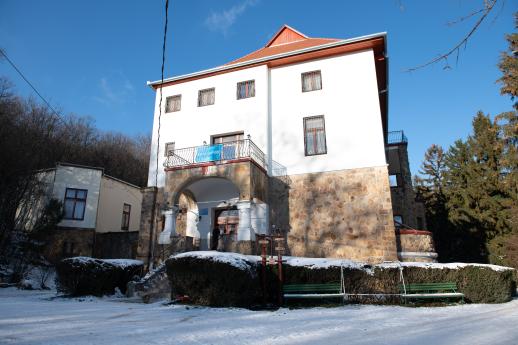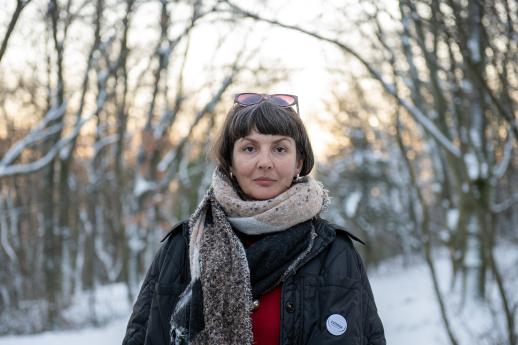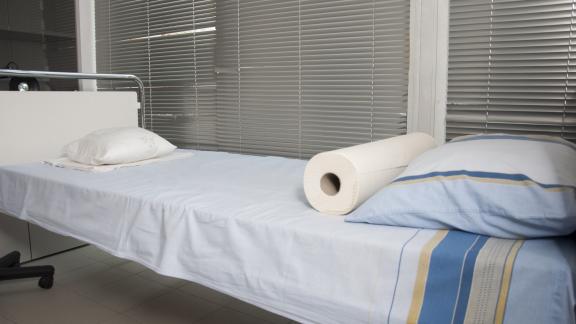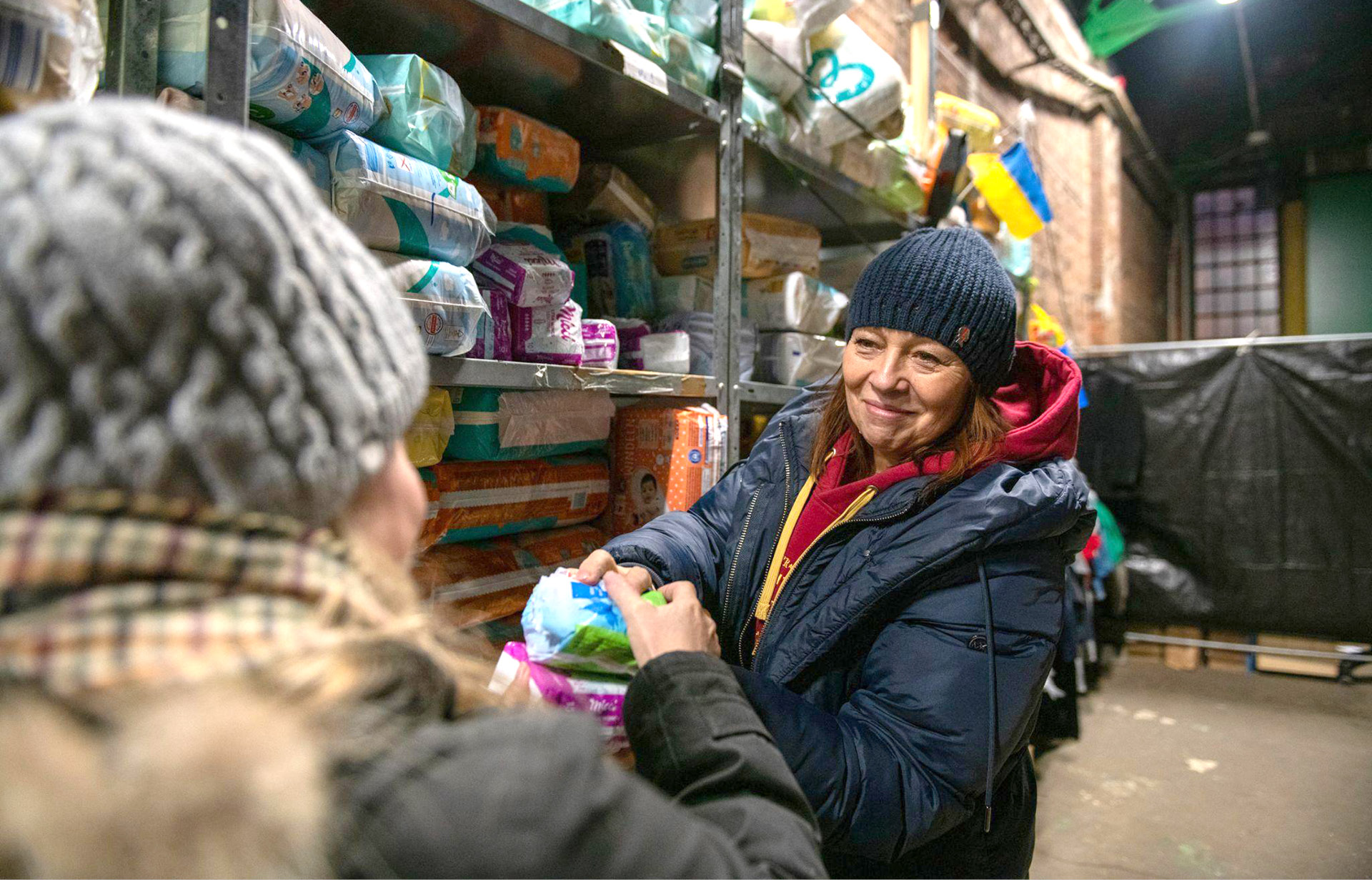None of us will forget the 24 February 2022, when the news broke that Russia had begun its illegal invasion of Ukraine. We in EMMA were amongst the thousands of Hungarians who did not hesitate to pack up our cars and head to the border, where we knew thousands of Ukrainian refugees would be arriving in the coming days, weeks, and months.
At first, we went in a personal capacity, as humans compelled to help fellow humans. But soon the EMMA Association realized there was a huge need and gap for refugee women and girls to have assistance accessing sexual and reproductive healthcare in Hungary. Most urgently, and importantly, they needed to access this care in a dignified and supported way.
This is EMMA’s specialization; we are a national women’s organization which works for the fundamental rights and societal equality of women, paying special attention to gender-based oppression and violence against women during the childbearing and childrearing period, which is known as obstetric violence.
Obstetric violence in the Roma community
The refugee women we were meeting ended up being the most intersectionally marginalized: women and girls from the Roma community. Most of the Roma people coming from the Transcarpathia part of Ukraine have dual citizenship, therefore they cannot apply for temporary protection status. But their dual citizenship status is merely symbolic, as many Roma have never crossed the border and this is their first time in Hungary.
The Roma community has suffered from substantial discrimination, prejudice and racism. Roma children are often undereducated, or not educated at all. The problems faced by Roma women and children are particularly severe; perhaps they are the most vulnerable group of refugees. Both patriarchal social norms and overall social inequalities have an aggravated impact on their daily lives and we regularly encounter a total lack of empathy and understanding when accompanying teenage mothers to medical appointments.
With the intersectional discrimination and vulnerability that stems from not only being part of the Roma community, but now refugees, Roma women and girls are highly vulnerable to obstetric violence. Young Roma women in particular are vulnerable to discrimination in maternity and gynaecological wards. Obstetric violence also includes the violation of human dignity, of patients' rights and of the autonomy of the woman giving birth from a position of authority. Obstetric violence is a highly under reported form of violence, and no European country has so far put in place legislation specifically criminalising it. Yet, it's something we bore witness to with the Roma community time and time again.
when
country
Ukraine, Hungary
region
European Network

With the intersectional discrimination and vulnerability that stems from not only being part of the Roma community, but now refugees, Roma women and girls are highly vulnerable to obstetric violence in maternity and gynaecological wards.


EMMA is a safe haven for many refugees from the Roma community
Hannah Maule-ffinchAdvocating for and protecting Roma women
An example of obstetric violence we witnessed is when a Roma woman was diagnosed with cancer; when the OBGYN told her the result, he was very offensive and brutally abusive. When she came out of the consultation room, she was very upset about this humiliating treatment. But she said, ‘I'm used to it. Whatever’. This is the approach Roma women have to take – to spend the least time within the medical system and leave as soon as possible. This same woman had a caesarean birth, and she left the hospital the following day, just to get out of the place.
Racism is not the only problem. Outdated and harmful birth practices, lack of soft skills and trauma-informed attitudes, the lack of transparency and accountability within maternity care are among the many factors that contribute to the abuse and harm done. The vulnerability of Roma women and girls is even more apparent, as it is aggravated by a lack of cultural competence and racial discrimination.
EMMA also assisted a Ukrainian refugee woman who did not speak Hungarian. We showed her around the medical facility and lab; we showed her where to lodge papers. When she went there by herself and showed her papers, which were different from the Hungarian papers, she was sent to this place, to that place. This is how the Hungarian system works. This woman did not have a social security number but rather a refugee temporary protection card. The lady at the medical reception said, ‘Oh, I am fed up’ because it means extra work for her, a burden. In the end, she gave up and the next time she asked us to go with her because that's the only way she could go through the ‘gate’. These are just some examples of obstetric violence experienced by Roma women in Hungary.
Education barriers impede rights
The situation is especially difficult for Ukrainian-based Roma women, because they live in completely closed, segregated areas in Ukraine and many do not speak Ukrainian. Due to a lack of education, Roma women are not acquainted with common medical or physiological terms in the Ukrainian or Hungarian language, presenting a huge barrier to accessing healthcare.
When we started to provide support to refugee women, we had a commitment and solid experience about how best to do it. We are deeply convinced that each and every woman and mother deserves respectful care without discrimination and without judgement, regardless of their socio-economic background, their education or their resources. Our attitude as helping professionals is rooted in this mindset, underpinned by our determination to build trustful and equal relationships with the mothers we accompany.
The deficiencies in knowledge about their own reproductive functions (like the location of the uterus and the ovaries, what happens to the baby within the uterus, the function of the umbilical cord and the placenta, how one gets pregnant) is not specific to Roma refugee women, it is a result of the community’s hopeless situation and lack of education. However, we see that women are able to make decisions about their lives and bodies if they receive relevant and understandable information fitting their current circumstances.
An unsafe medical system for some
The Hungarian maternity care system is not safe and respectful for middle-class, well-resourced women either. But while most women are seeking the best available care options, disadvantaged women are struggling to get any kind of care at all.
A crucial way in which EMMA protects women from obstetric violence is to accompany Roma women to their doctors’ appointments, as their guardians and advocates. We are also running a pilot project where a woman from the Roma community and trained as a doula is supporting the women in her small village. She accompanies the women to the local hospital, which is known to be a very abusive hospital. Just the fact that she's there, the women get better treatment because she's a witness to any maltreatment and can advocate for their rights.

A crucial way in which EMMA protects women from obstetric violence is to accompany Roma women to their doctors’ appointments, as their guardians and advocates.


Pálma Fazakas, President of EMMA in Hungary
Hannah Maule-ffinchInstitutionalized racism towards the Roma community is deeply ingrained across Europe, including in the medical system in Hungary. It will take a long time to change the attitudes of medical professionals towards the Roma community. One way to neutralize this situation is to have more people from the Roma community in the wider medical system, of which there are currently none, or very few.
As helping professionals we need to understand the weight and responsibility of working with victims and survivors of sexual and gender-based violence, including obstetric violence. Women have similar needs during the childbearing year and beyond: they need attention, support, respect and dignity. They do not often get that. Most women living in, and having grown up in a patriarchal society, feel vulnerable and defenceless. This susceptibility is multiplied in the case of Roma or refugee women. We bear witness to their struggles day in, day out during our work.
As long as the needs of disadvantaged, underserved and vulnerable groups are ignored, as long as judgement, victim-blaming, prejudices and racism pervades the healthcare system, women are not safe.
In the space of a year, our organisation has pivoted from being a national civil-society organisation advocating for women’s rights in Hungary, to being actors in the humanitarian system. Now, it falls to organisations like EMMA to be witness to refugee women’s experiences in the medical system and enable women to access the sexual and reproductive healthcare they deserve, free from obstetric violence.












